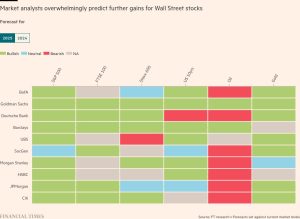Moody’s downgrades France’s credit rating over political turmoil

Unlock the Editor’s Digest for free
Roula Khalaf, Editor of the FT, selects her favourite stories in this weekly newsletter.
Moody’s downgraded France’s credit rating on Saturday, saying that it expects the country’s incoming government to struggle to tackle its deficit.
In an unscheduled announcement early on Saturday morning, the rating agency lowered France’s long-term issuer rating from Aa2 to Aa3, blaming political instability that will make it difficult to tackle the national deficit. France’s finances will be “substantially weakened” in the coming years, it said.
The move underlines the economic challenges facing new prime minister François Bayrou.
Former prime minister Michel Barnier’s minority government fell in a no-confidence vote earlier this month after he was unable to garner support in France’s fractured parliament for his tax and spending plans.
“There is now very low probability that the next government will sustainably reduce the size of fiscal deficits beyond next year. As a result, we forecast that France’s public finances will be materially weaker over the next three years compared to our October 2024 baseline scenario,” the agency said.
The move by Moody’s is likely to put further pressure on France’s government debt when trading reopens on Monday. Investors’ unease about the country’s fiscal situation has already pushed its 10-year borrowing costs above 3 per cent this year, and the additional margin that it pays over benchmark German debt is at its highest since the Eurozone debt crisis.
S&P Global Ratings downgraded France’s credit rating in May from AA to AA-, equivalent to Moody’s Aa3 rating. Fitch kept its rating at AA- in October but lowered its outlook from stable to negative, a precursor to a downgrade if improvements are not made.
After President Emmanuel Macron nominated long-term ally Bayrou as prime minister on Friday, Bayrou said in his acceptance speech that he would make tackling the debt burden a priority.
“Debt is a moral problem since putting it on the shoulders of our children is unacceptable,” he said.
France had a deficit of 5.5 per cent in 2023, the second highest in the Eurozone after Italy, according to EU figures. Moody’s expects this to reach 6.3 per cent in 2025 before gradually decreasing to around 5.2 per cent in 2027.
The country’s debt-to-GDP ratio would increase from 113.3 per cent in 2024 to 120 per cent in 2027, the agency predicted.
France has already been reprimanded by the European Commission for breaching an annual borrowing limit of 3 per cent of GDP, as part of efforts by Brussels to bring debt levels under control across the EU.
Bayrou faces the same difficult parliamentary arithmetic as Barnier did, with the country’s parliament fractured into three blocs after this summer’s legislative elections.
Moody’s said that France has significant credit strengths and a diversified economy. But there is a risk of a “durable increase” in the cost of financing the country’s debt that could create a “negative feedback loop between higher deficits, a higher debt load and higher financing costs”.
Bayrou’s first task will be to ask parliament to pass an emergency stop-gap budget law in order to avoid a shutdown of government services until a new budget can be passed next year. The centrist politician is in the process of appointing his government.
Outgoing caretaker finance minister Antoine Armand said he “takes note” of the Moody’s downgrade. “The appointment of Prime Minister François Bayrou and the reaffirmed desire to reduce the deficit provide an explicit response to this,” he said.
Additional reporting by Ian Smith in London
#Moodys #downgrades #Frances #credit #rating #political #turmoil






